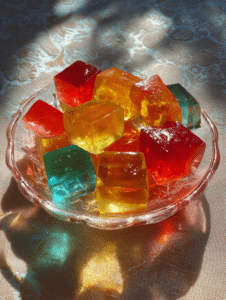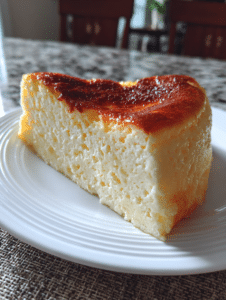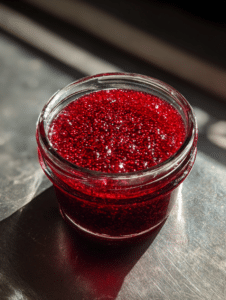Disclaimer: This content is for educational purposes only, not medical advice. Always consult with a doctor before making significant changes to your diet, especially if you have pre-existing health conditions.
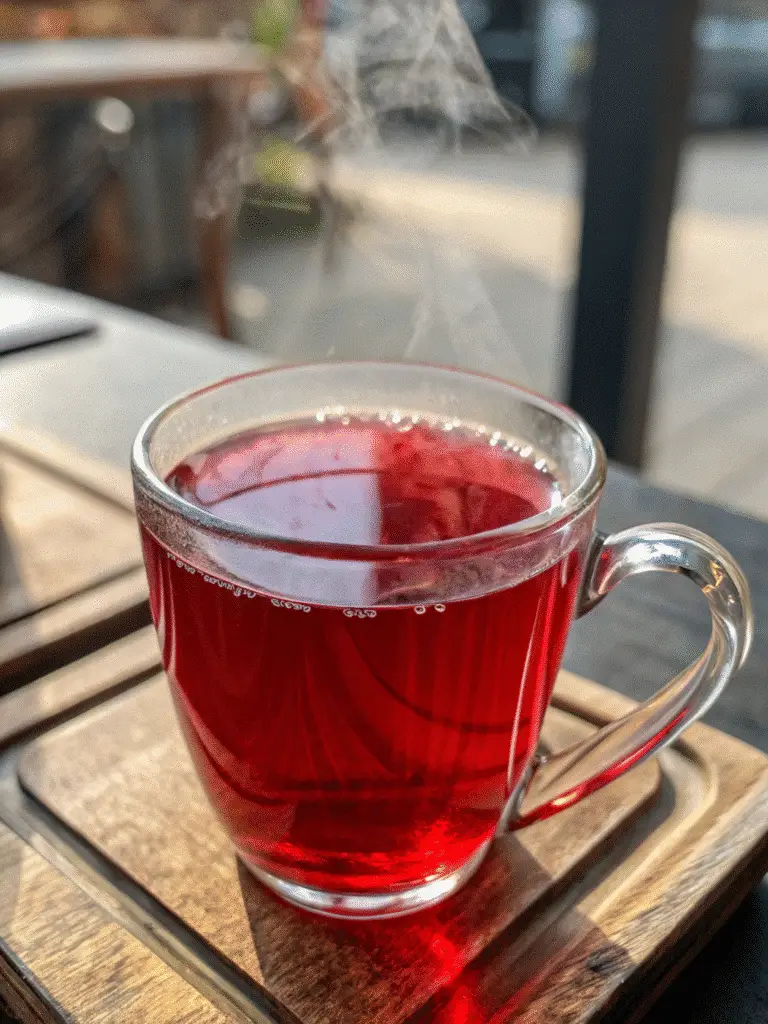
Hibiscus tea benefits go far beyond its vibrant red color and tart, cranberry-like taste. This caffeine-free herbal tea has been sipped for centuries across Egypt, Mexico, and the Caribbean for its refreshing flavor and health-supporting qualities. Today, researchers and wellness lovers alike celebrate hibiscus tea for its heart, hormone, and hydration benefits.
In this article, we’ll uncover what hibiscus tea is, its science-backed benefits, the risks to watch for, and how to enjoy it daily for the best results.
In this Article
Key Takeaways: What You Need to Know
- Hibiscus tea benefits include supporting blood pressure, reducing bloating, balancing hormones, and boosting antioxidants.
- Drinking it daily may help lower the risk of chronic disease when paired with healthy lifestyle habits.
- The best time to drink hibiscus tea is mid-morning or early afternoon for optimal absorption.
- While safe for most people, hibiscus tea can interact with medications or affect pregnancy.
- Men may benefit from improved circulation and cholesterol balance, while women often notice hormonal and digestive support.
- Like any wellness drink, hibiscus tea comes with pros and cons, the key is mindful daily intake.
The Story & Intro to Hibiscus Tea
What is hibiscus tea?
Hibiscus tea is a ruby-red herbal infusion made from the dried calyces of the Hibiscus sabdariffa flower. It’s naturally caffeine-free, tart like cranberry, and packed with antioxidants. Known as “karkadé” in Egypt and “agua de Jamaica” in Mexico, it has been enjoyed for centuries as both a daily refreshment and a medicinal remedy.
Unlike black or green tea, hibiscus tea doesn’t come from the Camellia sinensis plant. Instead, it’s a floral tisane celebrated for hydration, circulation support, and its bold, refreshing taste.
I first discovered hibiscus tea in a small café on a blistering hot afternoon. The owner handed me a chilled glass of dark red tea with lime. One sip, and I was hooked. It wasn’t just thirst-quenching — it felt like my body instantly exhaled.
Why hibiscus tea is more than just a trendy drink
What fascinates me about hibiscus tea is how deeply rooted it is in tradition. Egyptians sipped it to cool off in desert heat. Caribbean families brewed it with cloves and ginger for holiday gatherings. And today, wellness circles praise it for its antioxidant punch.
But here’s the truth: hibiscus tea isn’t a new health craze. It’s an ancient drink with modern relevance. That makes it different from quick-fix wellness trends. It has history, credibility, and plenty of research to back up why it’s worth brewing at home.
When I started creating functional recipes like the Natural Mounjaro Tea Recipe, hibiscus quickly became a staple ingredient. It blends beautifully with flavors like ginger, cranberry, or pink salt, and it transforms a simple hydration ritual into something both comforting and purposeful.
Hibiscus Tea Benefits for Everyday Wellness
What are the benefits of hibiscus tea?
The list of hibiscus tea benefits is long, but the biggest wins come from its antioxidant load. Those deep red petals are rich in anthocyanins, the same compounds found in blueberries and red grapes. These antioxidants help:
- Support healthy blood pressure by relaxing blood vessels
- Boost liver health by aiding detoxification
- Protect cells from oxidative stress that accelerates aging
- Ease bloating and water retention through mild diuretic action
- Balance cholesterol by lowering LDL and supporting HDL
I’ve personally leaned on hibiscus tea after long, salty days in the Texas heat. Within hours, I feel less puffy and more hydrated. It’s like giving my body a gentle reset.
When paired with recipes like this Pink Salt Diet Drink, it creates a hydrating duo that helps me bounce back fast.
Hibiscus tea benefits for men and women
For women, hibiscus tea can be a lifesaver around hormonal shifts. Its natural phytoestrogens may help regulate cycles, ease cramps, and support mood balance during PMS or perimenopause. I notice fewer cravings and a calmer mind when I sip it daily in the week before my cycle.
For men, hibiscus shines in cardiovascular health. Studies show it may lower cholesterol and improve circulation, both vital for long-term vitality. Some research even links hibiscus tea with improved testosterone balance thanks to its antioxidant effects.
I often suggest hibiscus alongside blends like the Natural Ozempic Drink Recipe for friends aiming to support metabolic health naturally.
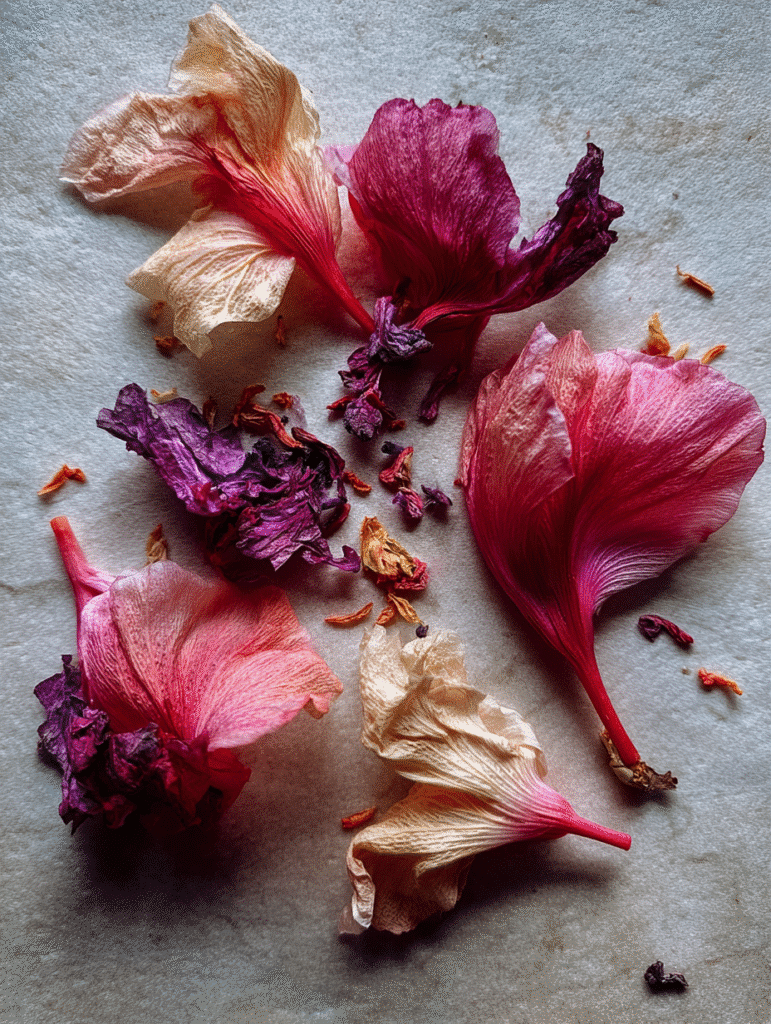
Daily Impact of Hibiscus Tea
What happens if I drink hibiscus tea every day?
Drinking hibiscus tea every day can feel like a small ritual with big rewards. Most people notice:
- Steadier blood pressure after 2–3 weeks of daily sipping
- Less bloating thanks to its natural diuretic properties
- Brighter skin from vitamin C and antioxidant support
- More balanced mood with its gentle hormone-friendly compounds
- Better hydration without the jitters of caffeine
When I swapped my second coffee for hibiscus tea, I felt calmer in the afternoons, slept better at night, and even saw my morning BP readings drop into a healthier range.
That said, daily hibiscus isn’t for everyone. If you have low blood pressure, are pregnant, or take certain meds, it’s best to sip sparingly.
For daily balance, I like to rotate hibiscus with blends like Mounjaro Tea so I get variety without overloading on any one herb.
Best time to drink hibiscus tea for optimal results
The best time to drink hibiscus tea depends on your goals:
- Mid-morning → Best for hydration and antioxidant absorption after breakfast
- Early afternoon → Helps reduce bloating and keeps energy stable without caffeine
- After salty meals → Supports your body in releasing extra water retention
- Evening (small cup) → A soothing way to unwind, especially when mixed with chamomile or mint
I don’t usually recommend drinking large amounts right before bed since it may send you running to the bathroom. Instead, I end my evenings with a half-cup blend of hibiscus and chamomile (bonus: you also get chamomile tea benefits like relaxation and better sleep).
Medicinal Uses of Hibiscus Tea
What are 10 medicinal uses of hibiscus?
Hibiscus tea benefits go far beyond hydration. Across cultures and research, hibiscus has been linked to at least ten impressive medicinal uses:
- Supports heart health by lowering blood pressure naturally
- Reduces cholesterol levels for better circulation
- Boosts liver detox and helps filter toxins
- Improves digestion and reduces constipation
- Eases PMS cramps with mild antispasmodic effects
- Balances hormones with natural phytoestrogens
- Strengthens immunity with vitamin C and antioxidants
- Supports weight management by regulating metabolism
- Fights inflammation that contributes to chronic disease
- Hydrates effectively without caffeine or sugar
In many ways, hibiscus tea acts like a natural daily supplement in a cup. It’s no wonder hibiscus tea benefits have been celebrated for centuries.
If you want to pair hibiscus with other functional drinks, the Apple Cider Vinegar and Cranberry Juice recipe makes a powerhouse duo for detox and hydration.
How much hibiscus tea should one drink on a daily basis?
The sweet spot for most adults is 1–3 cups daily. That gives you consistent hibiscus tea benefits without overloading your system. Each cup should contain about 1–1.5 tablespoons of dried hibiscus petals steeped in hot water.
Here’s a quick daily guideline:
- 1 cup → For light hydration and antioxidant boost
- 2 cups → For blood pressure support and bloating relief
- 3 cups → For more intensive benefits, but not beyond that
Too much hibiscus tea may lead to dizziness, low blood pressure, or stomach upset. Moderation ensures you enjoy hibiscus tea benefits safely.
On days when I want variety, I swap my afternoon cup for a metabolism-friendly blend like the Cranberry Juice and Apple Cider Vinegar recipe to give my body a different kind of reset.
Hibiscus Tea & Pregnancy
Is hibiscus tea good for you while pregnant?
This is where caution is key. While hibiscus tea benefits most healthy adults, pregnancy is a different story. Studies suggest hibiscus may stimulate uterine contractions, which could increase the risk of complications or miscarriage in early stages. Because of this, most health professionals recommend avoiding hibiscus tea during pregnancy.
The American Pregnancy Association notes that certain herbal teas, including hibiscus, are not considered safe during pregnancy due to their hormonal and uterine effects (source).
If you’re expecting, it’s best to skip hibiscus tea and save those hibiscus tea benefits for postpartum. Instead, lean on safe alternatives that bring relaxation and hydration without the risks.
Safer herbal alternatives during pregnancy
If you’re pregnant or breastfeeding but still want a calming cup, consider these safer choices:
- Chamomile tea benefits → Soothes stress, improves sleep, and supports digestion.
- Spearmint tea benefits → Helps reduce nausea and bloating without the risks of hibiscus.
- Ginger tea → A trusted ally for easing morning sickness and promoting circulation.
I’ve shared hibiscus tea with friends after pregnancy, but during pregnancy I always recommend gentle swaps like chamomile or spearmint. They deliver many of the same relaxing effects without interfering with hormones.
You can still get your daily boost from nourishing drinks like my Chia Seeds in Coffee recipe, which is pregnancy-safe and great for energy.
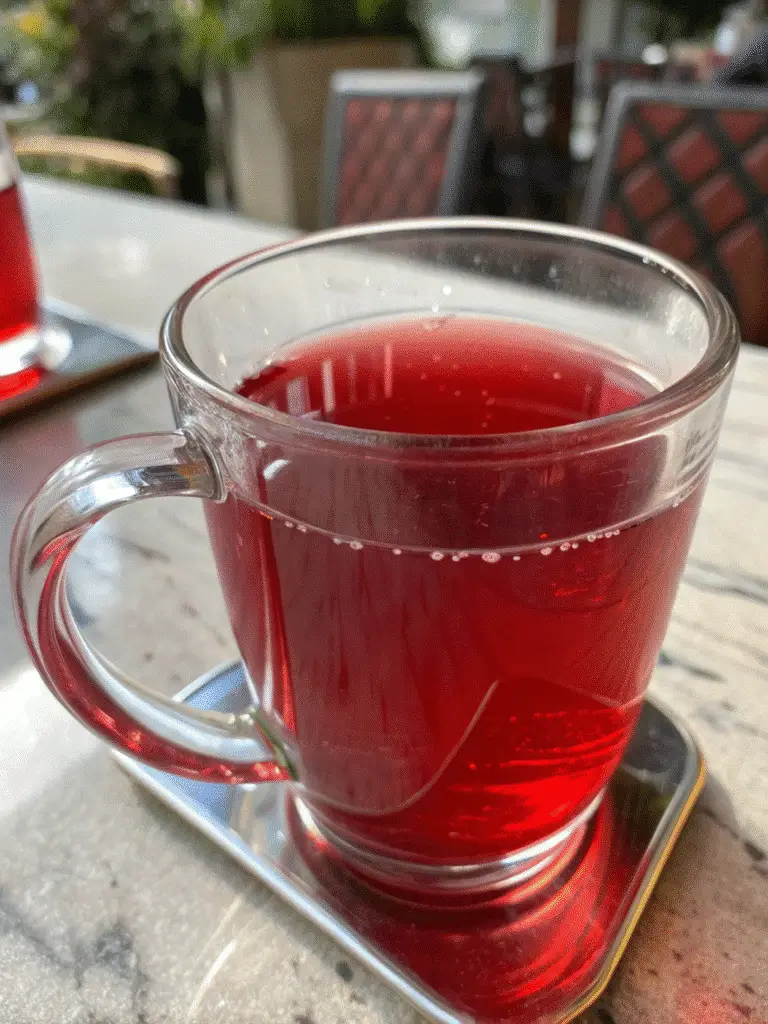
Hibiscus Tea & Chronic Disease
Can hibiscus tea lower the risk of chronic disease?
Yes — one of the most powerful hibiscus tea benefits is its potential to lower the risk of chronic diseases like heart disease, diabetes, and even certain cancers. This is thanks to hibiscus tea’s incredible load of antioxidants, including vitamin C, anthocyanins, and flavonoids.
Antioxidants protect cells from oxidative stress, which is a leading factor in chronic inflammation and disease. By reducing this stress, hibiscus tea benefits your cardiovascular system, metabolism, and even immune function.
Clinical studies have linked hibiscus tea to improved cholesterol levels, healthier blood pressure, and reduced markers of inflammation — all of which play a role in lowering long-term disease risk. Drinking hibiscus tea regularly is like giving your body a daily defense shield.
I often sip hibiscus after lunch with recipes like the Apple Cider Vinegar and Cranberry Juice combo because it doubles down on circulation and antioxidant power.
How antioxidants make hibiscus tea benefits long-term
The antioxidants in hibiscus tea don’t just work in the moment; they create a ripple effect over time. Consistent daily sipping may:
- Lower blood pressure and reduce strain on the heart
- Improve insulin sensitivity, reducing risk of type 2 diabetes
- Protect against oxidative stress, which accelerates aging
- Boost immunity and reduce vulnerability to seasonal illnesses
- Reduce systemic inflammation that drives chronic disease
For men, hibiscus tea benefits include stronger circulation and cholesterol balance. For women, the antioxidants help with skin health, hormone balance, and overall vitality.
Pairing hibiscus with other functional drinks like the Natural Mounjaro Tea Recipe can magnify these long-term wellness effects.
In short, hibiscus tea benefits don’t just make you feel good today — they may help protect your health for decades to come.
Hibiscus Tea Pros and Cons
The biggest hibiscus tea benefits (pros)
The list of hibiscus tea benefits is long, which is why it’s become one of my most recommended wellness drinks. The main pros include:
- Heart health support → Hibiscus tea helps lower blood pressure and cholesterol, reducing strain on the cardiovascular system.
- Digestive comfort → It eases bloating and acts as a mild diuretic.
- Hormone balance → Its phytoestrogens may help regulate cycles and support mood during PMS or perimenopause.
- Metabolism boost → Some studies link hibiscus tea to improved fat metabolism and weight support.
- Antioxidant protection → The anthocyanins in hibiscus tea protect cells from damage and lower inflammation.
- Caffeine-free hydration → Unlike coffee or black tea, hibiscus tea hydrates without causing jitters or disrupting sleep.
I often pair hibiscus with blends like the Natural Ozempic Drink Recipe to round out my hydration routine with more functional benefits.
Hibiscus tea dangers & side effects (cons)
Despite all these hibiscus tea benefits, there are important risks to know:
- Blood pressure too low → Hibiscus can drop blood pressure significantly. For people already on BP medication, this may cause dizziness or fainting.
- Hormonal effects → Hibiscus may affect estrogen balance, so those pregnant, breastfeeding, or trying to conceive should avoid it.
- Drug interactions → Hibiscus tea may interact with diuretics, ACE inhibitors, and diabetes medications.
- Stomach sensitivity → The tart acidity can cause nausea or irritation on an empty stomach.
- Dental staining → Over time, the deep red pigment can stain teeth like coffee or wine.
These cons don’t cancel out the many hibiscus tea benefits, but they do remind us that moderation is everything.
I like to alternate hibiscus with drinks like the Cranberry Juice and Apple Cider Vinegar blend or the Chia Seeds in Coffee recipe so I get variety without overdoing it.

Hibiscus Tea Recipe
Equipment
- 1 Kettle For boiling water
- 1 Tea infuser or French press To steep petals
- 1 Mug or teacup To serve
Ingredients
- 1.5 tbsp Dried hibiscus petals Hibiscus sabdariffa variety
- 2 cups Filtered water Boiling
- 1 slice Lemon Optional for brightness
- 1 tsp Raw honey or sweetener Optional to taste
Instructions
- Boil 2 cups of filtered water in a kettle.
- Place 1.5 tablespoons of dried hibiscus petals in an infuser or French press.
- Pour boiling water over the petals.
- Let steep for 5 to 10 minutes, depending on desired strength.
- Strain into a mug.
- Add lemon and/or sweetener if desired.
- Serve hot and enjoy immediately.
Notes
Nutrition
FAQ: Quick Answers About Hibiscus Tea
What is hibiscus tea?
Hibiscus tea is an herbal infusion made from the dried petals of the Hibiscus sabdariffa plant. Known for its deep red color and tart, cranberry-like taste, it is caffeine-free and packed with antioxidants.
What are the benefits of hibiscus tea?
The main hibiscus tea benefits include lowering blood pressure, improving cholesterol, easing bloating, supporting hormone balance, boosting liver detox, and strengthening immunity with vitamin C and antioxidants.
What happens if I drink hibiscus tea every day?
Daily hibiscus tea may help regulate blood pressure, reduce bloating, support hormones, and provide antioxidant protection. Most people thrive on 1–3 cups per day, though those with low blood pressure or pregnancy should avoid it.
What are 10 medicinal uses of hibiscus?
Hibiscus tea benefits include heart health, cholesterol control, liver detox, hormone balance, PMS relief, digestion support, inflammation reduction, immune boost, hydration, and antioxidant protection.
Is hibiscus tea good for you while pregnant?
No. Hibiscus tea is not recommended during pregnancy because it may trigger uterine contractions and affect hormone balance. Safer options include chamomile or spearmint teas.
Can hibiscus tea lower the risk of chronic disease?
Yes, hibiscus tea benefits include antioxidant protection that may lower the risk of chronic diseases like heart disease, diabetes, and inflammation-driven conditions when consumed regularly.
Conclusion: Why Hibiscus Tea Belongs in Your Cup
When I think about hibiscus tea benefits, I don’t just think of antioxidants or blood pressure numbers. I think of a daily ritual that helps me feel lighter, calmer, and more connected to traditions around the world.
Hibiscus tea is more than a wellness trend, it’s an ancient plant with modern science to back it up. If you’re looking for a simple way to support your heart, hormones, and hydration, a ruby-red cup of hibiscus tea might just be your new favorite ritual.

